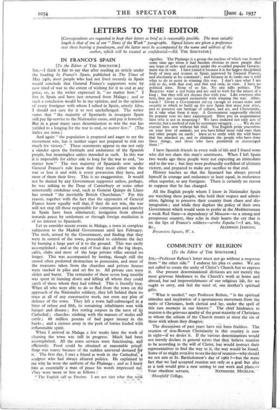COMMUNITY OF RELIGION [To the Editor of THE SPECTATOR.] -
Sut,—Professor Relton's letter must not go without a response from "the other side." I endorse his plea ex' aninio. We .are not called to create the unity of Christ's Church but to express it. Our present denominational divisions are not merelythe most grievous hindrance to the ChUrch's Work -at hoMe and abroad, but- sad impoverishinent§ Of our religious life, for we ought to envy, and feel the need of, one 'anther's spiritual' gifts. • " What is needed," says Professor Relton, " is the spiritual stimulus and inspiration of a spontaneous movement from the ranks of Christians., in clerical and lay, under the spell of this rare moment in our history." The chief hindrance to reunion is the grievous apathy of the great majority of Christians to whom the schism of the Chureh means at most the sin of those with whom they disagree.
The discusfsions of past years have not been fruitless. The reunion of non-Roman Christianityinthis country is now in sight—if we desire it. If the various denominations would not merely declare in general terms that they believe reunion to be according to the will of Christ, but would instruct their representatives to find the way to it, the way would be found. Smile of us might even live to see the day of reunion—whyshould we not aim at St. Bartholomew's day of 1962 ?—but the mere fact that-we had accepted reunion not only as a goal but also as -a- task would give- a new setting to our work and plans.— 'Mansfield Cdlleie.










































 Previous page
Previous page